By RP Staff, on Wed Jul 11, 2012 at 10:00 AM ET The Politics of Liberty
Protesters marched in Mexico City, demanding justice after accusations that president-elect Enrique Pena Nieto bought off votes. [NYT]
A chargeable tweet: one Bahraini activist will do 3 months hard time for 140 characters or less. [Chicago Tribune]
In Egypt more political uncertainty is on the way and threatening the nation’s fledgling democracy. [Washington Post]
Some governors have charged the Supreme Court health-care ruling as an affront to American freedoms. But where does principle end and voter politics begin? [Brookings]
By Kathleen Kennedy Townsend, on Tue Jun 5, 2012 at 8:30 AM ET 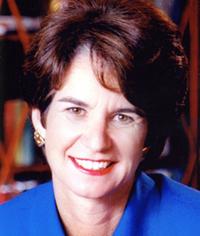 The following speech was addressed on May 9, 2012 to the Denver Forum by Kathleen Kennedy Townsend. The following speech was addressed on May 9, 2012 to the Denver Forum by Kathleen Kennedy Townsend.
It’s great to be with you and I am delighted my good friend George Mitrovich asked me to speak to The Forum today.
I came to Denver to celebrate the 50th anniversary of the Migrant Workers Health Act at the Community Health Center Convention. Celebrations are a wonderful time to look at what our country valued a half century ago – and to compare it to the values of our own time.
In the anti-immigrant fervor, it is hard to imagine, that a nation would decide to protect the health of migrant workers. And yet they did.
So today, at The Forum, I would like to talk with you about what is going on in our country, to suggest we need to renew our faith in one another.
A nation works best when all of its people feel that they have a role, when all can fully participate, when each is inspired by an ideal greater than one’s own desires; for everyone needs to be part of a compelling mission. The Framers of our country believed that, President Kennedy believe that, as did my father and Martin Luther King, Jr. and President Obama.
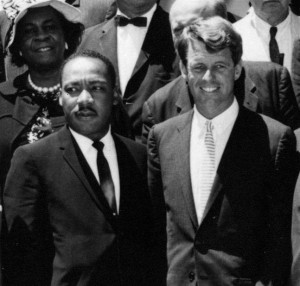 America was founded as a “mission into the wilderness.” And in that wilderness, we have explored new frontiers – in science, business and politics. We accomplished the most when we had a sense that we were connected to one another. Sometimes that happens because in fact we are. Americans feel World War II was the good war – in large part because all participated – fought, worked in factories, accepted wage and price controls. Sometimes we feel connected because we feel enlarged by the mission of a few – putting a man on the moon. Or connected to the courage of a small but determined group – the Civil Rights Movement in the early sixties and protesting the war in Vietnam. America was founded as a “mission into the wilderness.” And in that wilderness, we have explored new frontiers – in science, business and politics. We accomplished the most when we had a sense that we were connected to one another. Sometimes that happens because in fact we are. Americans feel World War II was the good war – in large part because all participated – fought, worked in factories, accepted wage and price controls. Sometimes we feel connected because we feel enlarged by the mission of a few – putting a man on the moon. Or connected to the courage of a small but determined group – the Civil Rights Movement in the early sixties and protesting the war in Vietnam.
Read the rest of…
Kathleen Kennedy Townsend: The Spirit of America: Promise & Reality
By Krystal Ball, on Thu Feb 23, 2012 at 8:30 AM ET  State mandated-transvaginal probes! State mandated-transvaginal probes!
Well Virginia, you certainly know how to get a gal’s attention. This weekend I went home to Virginia, partly to give my parents their granddaughter fix but partly to survey the political landscape. My home state has suddenly become the focus of national attention due to extreme anti-woman legislation that looks ready to be passed by the Republican legislature and could yet be signed into law by Republican Governor and vice presidential hopeful Bob McDonnell. The truth is that Virginia’s lady problems go way beyond what I like to call PAP (Probes and Personhood).
For years, a slim Democratic margin in the Virginia Senate and a hold on the governorship kept extreme legislation from becoming law. But since Republicans took over both chambers and the governor’s mansion, each bill has been more hard-edged than the last. With PAP, the Virginia GOP seem to finally have crossed a line — and it may well doom McDonnell’s national ambitions.
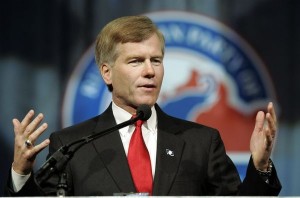 In 2009, the Democratic nominee for governor, Creigh Deeds, was swept away by a rising tide of anti-Obama Tea Party fervor and Bob McDonnell became governor, pledging to focus like a laser on jobs. In fact, his campaign slogan was “Bob’s for Jobs.” Poor Creigh didn’t stand a chance against someone whose name actually rhymed with jobs! Democrats, however, held onto the State Senate by a slim two-seat margin. The divided government was good for McDonnell, who clearly harbors national ambitions for 2012 and beyond. The Democratic Senate acted as a levee holding back the steady flow of extreme legislation coming out of the Republican House of Delegates. In addition to keeping the worst laws off the books, the Democratic Senate unknowingly did a favor for Bob McDonnell by saving him from becoming the critical deciding factor between Republican red-meat radicalism and mainstream sentiment in an increasingly purple state. In 2009, the Democratic nominee for governor, Creigh Deeds, was swept away by a rising tide of anti-Obama Tea Party fervor and Bob McDonnell became governor, pledging to focus like a laser on jobs. In fact, his campaign slogan was “Bob’s for Jobs.” Poor Creigh didn’t stand a chance against someone whose name actually rhymed with jobs! Democrats, however, held onto the State Senate by a slim two-seat margin. The divided government was good for McDonnell, who clearly harbors national ambitions for 2012 and beyond. The Democratic Senate acted as a levee holding back the steady flow of extreme legislation coming out of the Republican House of Delegates. In addition to keeping the worst laws off the books, the Democratic Senate unknowingly did a favor for Bob McDonnell by saving him from becoming the critical deciding factor between Republican red-meat radicalism and mainstream sentiment in an increasingly purple state.
Read the rest of…
Krystal Ball: How the Virginia GOP Could Tank Bob McDonnell’s Political Fortunes
By Jeff Smith, on Tue Jan 17, 2012 at 12:30 PM ET  Jeff Smith: Rebuttal #4 Jeff Smith: Rebuttal #4
[The RP’s Provocation; Jason Atkinson’s Rebuttal #1; The RP’s First Defense: Jason Atkinson’s First Response; Artur Davis’ Rebuttal #2; The RP’s Second Defense; Artur Davis’ First Response; Ron Granieri’s Rebuttal #3]
I think drug legalization is a little like campaign finance reform, or Lay’s potato chips: You can’t do it halfway (or, you can’t eat just one).
That’s why I think Jonathan’s wrong. We shouldn’t legalize marijuana. We should decriminalize all drugs. Prohibition has accomplished a few things. It has driven up the price of drugs dramatically given the risks that market players take every day. It has increased the potency of drugs and made them more dangerous than they would be if legal and regulated; every year thousands die from taking drugs that are laced with toxic substances. It has helped lead to the imprisonment of a generation of mostly minority young males, many of whom have substantial talents and aptitude for capitalism (and took advantage of their skills in the only thriving industry in their neighborhoods). And of course, because of the outsized profits available to those willing to risk their liberty and indeed, their life, prohibition helped give rise to an epidemic of violence that plagued inner cities for decades and has to a lesser extent hit rural America via meth.
Read the rest of…
The RPs Debate Marijuana Legalization: Jeff Smith Rebuts
By Zac Byer, on Tue Nov 22, 2011 at 12:30 PM ET Did you know that China is considering scrapping its one-child policy? Well, that’s according to “Chinese authorities” like the Deputy Director of the Committee of Population, Resources, and Environment (and I thought our government was bloated). I doubt changing the policy is a big priority in China right now… [Market Watch]
A great song by one of the greatest bands of all time. Here is the Grateful Dead with “Liberty.” The Dead first performed it in 1993. Over the next two years, they jammed on it some 50 times. [YouTube]

Interesting blog post on Tim Tebow, “Tebowing,” and religious liberty. [Manhattan Declaration]
By Zac Byer, on Tue Nov 15, 2011 at 12:30 PM ET As Newt Gingrich rises in the polls, you may want to read “Protecting Life and Religious Liberty” platform. I don’t really see anything new…have all the issues in this category been tapped out? [Newt.org]

Send your friends and family a patriotic e-card! [Assorted Patriotic E-Cards]
Here is a speech on liberty given by Abraham Lincoln in Baltimore on April 18, 1864. Read a few lines of the speech and then close your eyes and think of Lincoln. When I do that, I can see the gears churning in our beloved Abe’s head. [Lincoln in 1864]
By Zac Byer, on Tue Nov 1, 2011 at 12:30 PM ET As the country continues to debate the role of the federal government in the health insurance arena, we ought to consider the historical framework of risk and liberty upon which America rests. [YouTube – The Federalist Society]
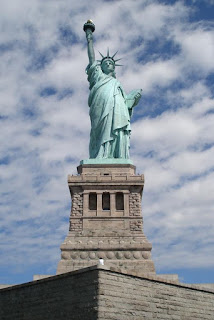
Interesting note from about 5 years ago about Milton Friedman’s evaluation of liberty and drugs. Basically, Friedman concluded that drugs themselves are not the problem, but rather their illegality causes the troubles. [The People’s Voice]
Here is a letter from Libertarian Party Chairman Mark Hinkle addressed to the Occupy protestors. Both groups are upset about crony capitalism, but the Libertarians would rather direct their frustrations at Washington, DC rather than Wall Street. I agree. [Libertarian Party]
By Zac Byer, on Tue Oct 25, 2011 at 12:30 PM ET Score another one for Liberty. Here’s news about the liberation announcements in Libya that followed Muammar Gaddafi’s death. [National Post]
Things got a little out of control on Friday at my alma mater, Penn. House Majority Leader Eric Cantor was scheduled to speak at 4:30, but he canceled abruptly. Why wouldn’t the Congressman want to speak to a few hundred respectful, inquisitive college students? Well, I think he would…but that wasn’t who he was going to be speaking to if he actually showed up. Occupy Philadelphia marched from City Hall to Penn’s campus and effectively guaranteed themselves of being the first (300) to be let into the event. [The Daily Pennsylvanian]

Can a person or company make “too much” money? [CNBC]
By Artur Davis, on Fri Oct 21, 2011 at 11:30 AM ET The Internet tubes are abuzz over a highly controversial op-ed piece penned by contributing RP and former Alabama Congressman Artur Davis in the Montgomery Advertiser. As you can read below, Davis has changed his mind from formerly opposing a voter identification law in his home state. As always, we encourage a healthy debate, and your opinions are welcome in the comments section below:
 I’ve changed my mind on voter ID laws — I think Alabama did the right thing in passing one — and I wish I had gotten it right when I was in political office. I’ve changed my mind on voter ID laws — I think Alabama did the right thing in passing one — and I wish I had gotten it right when I was in political office.
When I was a congressman, I took the path of least resistance on this subject for an African American politician. Without any evidence to back it up, I lapsed into the rhetoric of various partisans and activists who contend that requiring photo identification to vote is a suppression tactic aimed at thwarting black voter participation.
The truth is that the most aggressive contemporary voter suppression in the African American community, at least in Alabama, is the wholesale manufacture of ballots, at the polls and absentee, in parts of the Black Belt.
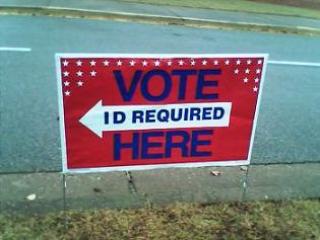 Voting the names of the dead, and the nonexistent, and the too-mentally-impaired to function, cancels out the votes of citizens who are exercising their rights — that’s suppression by any light. If you doubt it exists, I don’t; I’ve heard the peddlers of these ballots brag about it, I’ve been asked to provide the funds for it, and I am confident it has changed at least a few close local election results. Voting the names of the dead, and the nonexistent, and the too-mentally-impaired to function, cancels out the votes of citizens who are exercising their rights — that’s suppression by any light. If you doubt it exists, I don’t; I’ve heard the peddlers of these ballots brag about it, I’ve been asked to provide the funds for it, and I am confident it has changed at least a few close local election results.
There is no question that a voter ID law, in order to pass legal muster and in order to be just, must have certain characteristics. It should contain exceptions for the elderly or disabled who may not drive, and as a consequence lack the most conventional ID, a driver’s license. There should also be a process for non-drivers to obtain a photo ID, and the process has to be cost-free, for the simple reason that even a nominal financial impediment to voting looks and feels too much like a poll tax.
It is my understanding that the Alabama statute contains each of these exceptions and a few others, including a provision for on-site polling officials to waive the requirement if they attest that they know the voter.
The fact that a law that is unlikely to impede a single good faith voter — and that only gives voting the same elements of security as writing a check at the store, or obtaining a library card — is controversial does say much about the raw feelings in our current politics. The ugliest, hardest forms of disfranchisement were practiced in our lifetimes, and its still conventional rhetoric in black political circles to say those times are on the way back. Witness a last-minute automated call to black voters in the 2010 general election by state Sen. Hank Sanders, an ingenious lawyer and a skillful legislator who knew better, but who also knew the attack would resonate.
Read the rest of…
Artur Davis: I Should Have Supported Voter ID Law
By Zac Byer, on Tue Oct 18, 2011 at 12:30 PM ET Here are the details on tonight’s GOP debate from Nevada. I wonder what the Vegas odds are that Herman Cain’s “9-9-9 Plan” is mentioned within the first 9 seconds. [2012 Election Central]
The recently freed American hikers detained in Iran support Occupy Wall Street in Oakland, California. Do you? [Mercury News]

90% of North Koreans who defected to South Korea considered Kim Jong-Il’s remarks as good as law. Makes the Supreme Court’s constitutional jurisprudence read like a peaceful bedtime story. [Yonhap News Agency]
|
The Recovering Politician Bookstore
|




















